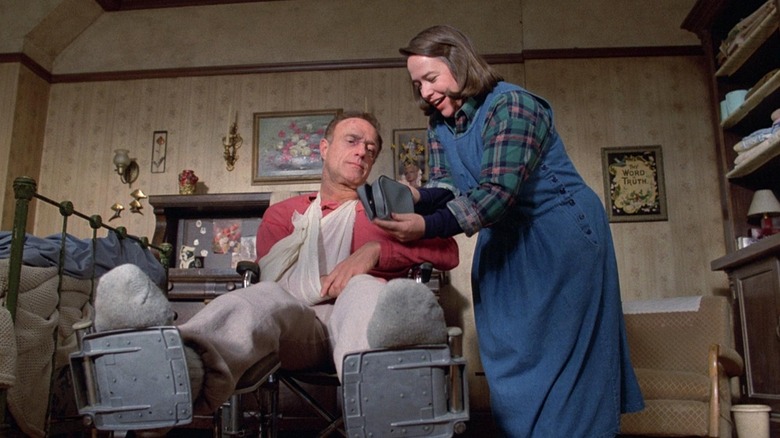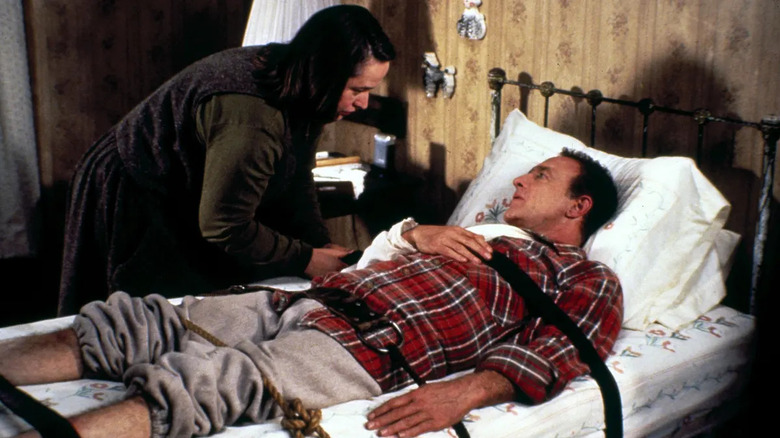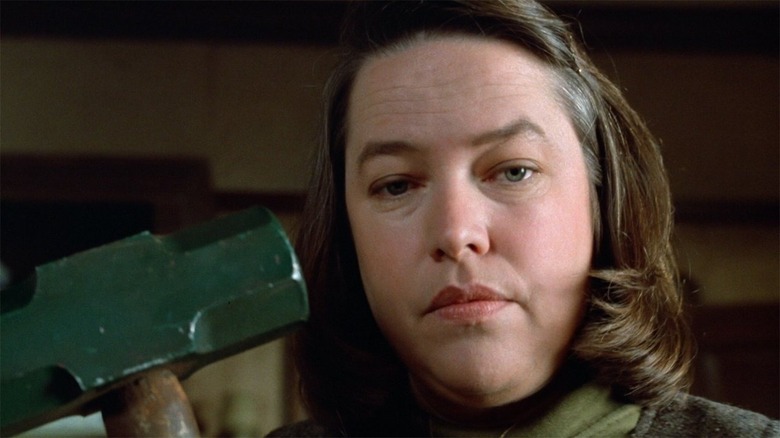James Caan Thought His Misery Casting Might Be A 'Sadistic Joke'
In 1979, Stephen King was in New York for an appearance on a late-night talk show. Greeted by fans outside the studio, one man, claiming to be the author's "Number One Fan," wanted a polaroid photo with his idol instead. King was in a hurry so he relented to the request and signed the picture. The name the man gave was Mark Chapman.
Later, King couldn't say for certain whether it was the same Mark Chapman who shot John Lennon just a few hours after getting his autograph, but the incident unnerved the author. He already had a somewhat ambivalent towards his more ardent fans (via Washington Post):
"You look in their eyes, and it's like looking into vacant houses. They don't know why they want autographs. They just want them. And then you realize, not only is this house vacant, but it's haunted."
The brush with a fan who may or may not have been the man who was hellbent on murdering a celebrity, any celebrity, gave him the germ of an idea for a novel. Published in 1987, "Misery" told the tale of Paul Sheldon, a bestselling author who falls into the hands of a deranged admirer after suffering a terrible car crash. As with "The Shining," the book had strongly autobiographical elements and fell into a claustrophobic sub-genre of King's fiction; a protagonist trapped in a confined location where they must confront their monsters, whether physical, supernatural, psychological, or some combination of the three.
When it came to the film adaptation, a role requiring the lead actor to lay prone and vulnerable in bed for much of the movie was an unusual remit, and several big names including Harrison Ford, Al Pacino, Gene Hackman, and Robert Redford, all passed. The part eventually landed with an actor better known for tough guys and hotheads: James Caan. How would he play such a passive character?
James Caan was ready to lie down for his art
During the '70s, James Caan became a bankable star after his explosive Oscar-nominated performance as Sonny Corleone in "The Godfather," but fell off the radar in the early '80s after his sister tragically passed away. He gradually returned to acting with a role in Coppola's "Gardens of Stone" and playing a detective with an extraterrestrial partner in "Alien Nation," but "Misery" was his big comeback, even if Caan himself was mystified by why he was picked (via LA Times):
"I sometimes wondered if this was a sadistic joke on Rob's part. You know, 'Let's get the most hyper guy in Hollywood to stay in bed for 15 weeks.' . . . I was doing something I'd never done. For me, this being a totally reactionary character is really much tougher."
It was shrewd casting. If you watch Caan in interviews, he's always charming but a little prickly, which was well suited to the character of a celebrity author who would probably be used to brushing off annoying or just plain weird fans. He was also completely believable as a man who had made good after a hardscrabble childhood yet retained something of the streets in his attitude, again suited to an actor like Caan who always took a little of the Bronx with him.
When Reiner talked about how he kept Caan in character, it seemed there was a tiny bit of sadism involved, even if it was for the benefit of the movie (via USA Today):
"Being stuck in that bed, which he is in the entire film, having him hemmed in, created more frustration and helped him play the part. [Caan] kept thinking I would give him some wisdom, but each time, I'd just say 'Jimmy, in this scene you're in bed.' And then I'd walk away."
Kathy Bates was Caan's perfect match
"Misery" paired Caan with Kathy Bates, which was another very canny casting choice. She was a Tony-award nominated stage actor making a transition into movies, but for most viewers, she was a virtual unknown. This worked perfectly for the character. Who was this burly woman in sensible sweaters using folksy phrases like "cockadoodie" and "dirty birdy" when she got mad? And what the hell was she doing with that sledgehammer?
Reiner often shot her from low angles, representing Sheldon's point of view, making her loom over his bed as a believable physical threat to her captive. As scary as she is, William Goldman's terrific screenplay also gave Bates plenty to play with. We can see the many years of loneliness and hurt as she swings from despondent to simpering to psychotic rage, and in her calmer moments, we even get glimpses of who she might have been if she wasn't insane. The role made Bates an instant sensation and she won an Oscar and a Golden Globe for her performance.
Reiner, who had mostly directed comedies before, does a great job of cranking up the suspense as Sheldon plots his escape, but "Misery" really works best as a two-hander between two terrific actors, and the director uses his ear for comedy to wring plenty of humor out of the situation.
The success of "Misery" relaunched Caan in a big way, and many of the most memorable roles in the second half of his career were comedic ones, with terrific turns in "Honeymoon in Vegas," "Bottle Rocket," and "Elf." So while he may have thought Reiner putting him to bed for 15 weeks was a little sadistic, it sure got him back on his feet again.


